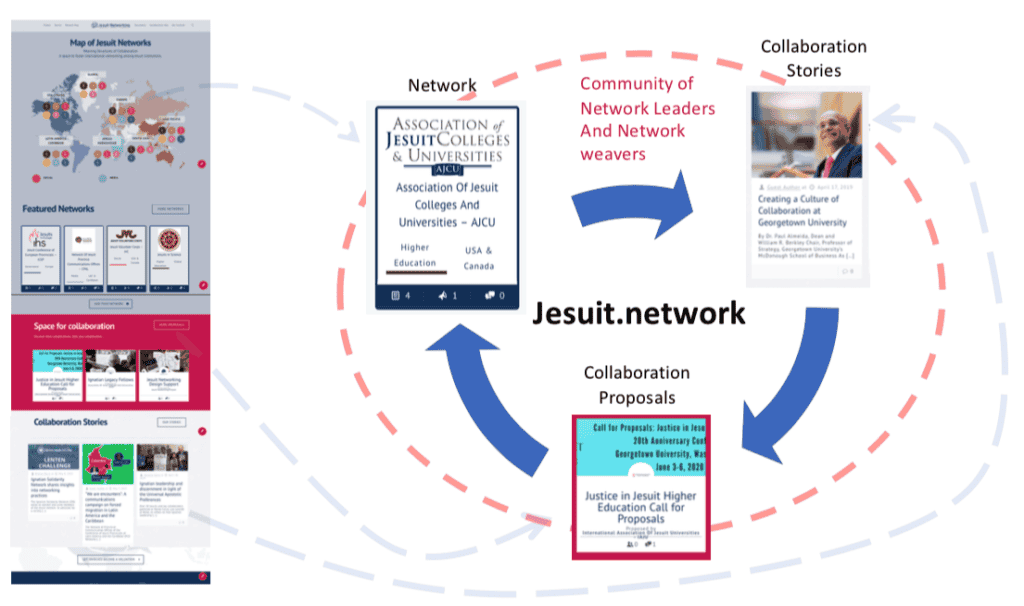This website uses cookies so that we can provide you with the best user experience possible. Cookie information is stored in your browser and performs functions such as recognising you when you return to our website and helping our team to understand which sections of the website you find most interesting and useful.
An Ecosystem for Networks?
As the jesuit.network website becomes known, there are many who write to us asking what exactly this project is. Since 2012 we have been promoting this line of work that has not always been easy to understand. In a very short way, jesuit.network is a space for the visibility, connection and promotion of international networks linked to the mission of the Society of Jesus. What is intended is to bring networks together in the same ecosystem where they can meet, share learning about collaboration and foster concrete opportunities for joint actions.
That is why the web is simply a mixture of three elements: COLLABORATIVE NETWORKS + COLLABORATION HISTORIES + COLLABORATION PROPOSALS. All this injected in a decentralized way by the leaders of each network, and interacting with the community of “network weavers” from the Jesuit world that we have been cultivating since 2012.

This is the main audacity of the project: we are a network about networking, composed by networks and network weavers of the Jesuit mission world. We believe that this supra-provincial and inter-sectoral collaborative ecosystem is one of the necessary tools for the promotion of collaboration and networking in this interesting stage of global apostolic configuration we are living in.
Hopefully now it is clearer what we mean when we answer that jesuit.network is simply an ecosystem for Jesuit networks. How would you explain it?






2 Comments
The idea of jesuit.network responds, no doubt, to the foundational universalist character of the Society of Jesus.
Can the network be considered as a sharing of work and knowledge? Is it a way to avoid or reduce possible errors of approach in collaborative actions and projects? Knowledge and training is a central aspect of the Society of Jesus, together with the search for “human” excellence that we must consider perfectible and should be understood as an objective to pursue.
The human being can be considered as a machine adapted and adaptable to the environment conditions, with an initial adapted baggage, imperfect, but adequate. Adaptation takes time, which seems to be currently unavailable. Can this be an inconvenience for the concept and development of networks?
If human efficiency seems to have limits, artificial intelligence (A.I.) and “deep learning” can give the impression that they do not. The influence that these technologies have and their current development is not sufficiently known. The “network” ecosystem must answer to the human premises, since the tendency to maximize efficiency (I.A.) may go against it.
On the other hand, together with this unifying and global trend, we can find the localist aspect, not to be underestimate.
The ecosystem needs and demands diversity, which implies a greater capacity to absorb changes and the possibility of self recovery.
The ecosystem analogy is very interesting and refers us to producing elements, which we could equate to the network leaders or “influencers”, to the consumers or “followers” and finally the decomposers or recyclers, figure I can’t find parallel in networks definitions actually.
In the dynamics of ecosystems, the introduction of new participants can have disruptive effects. In some cases it can lead to collapse and disappearance of others within the ecosystem. But ecosystems have the ability to recover. The difference between a collapse and a slow recovery depends on two factors: the toxicity of the introduced element and the resilience of the original ecosystem.
Ecosystems are random governed. An ecosystem is the result of the sum of the individual responses of the participants to contributions, collaborations or requests received. If the number of members of an ecosystem is high, the amount of contributions will be too. Networks have survived continuous changes through natural selection. Thanks to this, the networks have been continuously adapting to the changes, otherwise disappears.
Thanks for your comment Francisco, your reflections about the “Ecosystem” concept are really interesting. At the moment the idea is just a dream, because it’s being very hard to catalyze real collaborative dynamics at the international level, specially when you go cross-sector and supra-provincial. We are always thinking not just in sharing knowledge but specially to co-create better apostolic answers discerned and planned from a wider level of agency than the ones we are used to. The Jesuit.Network platform is designed in a way that every jesuit network can contribute, push its own content, ideas, and participate of any potential conversation. But we are at the very early stages of that dream.